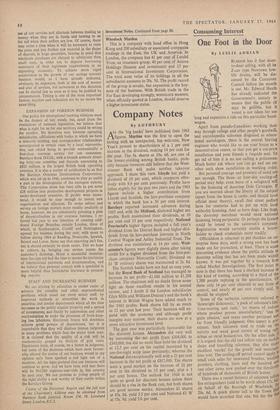Company Notes
By LOTHBURY
LL the 'big banks' have published their 1963 ilLfigures. Martins was the first to open the batting with an unexpected, but welcome, New Year's present to shareholders of a 1 per cent increase in the dividend, making 14 per cent for the year. The 5s. shares at 19s. 6d. are one of the lowest-yielding among British banks, prob- ably because investors still believe that the West- minster Bank will make another takeover approach. I share this view. Lloyds has paid a dividend of 10 per, cent, which compares effec- tively with 9.9 per cent previously. Profits have fallen slightly for the past two years and the 1963 figures include a higher contribution from Lloyds and Scottish, the hire-purchase company in which the bank has a 50 per cent interest. Barclays reported increased advances during 1963 and, with the Midland, disclosed higher net profits. Both maintained their dividends, at 10 per cent and 15 per cent respectively. National Provincial's higher figures included a full year's dividend from the District Bank and higher divi- dends from its hire-purchase interests in North Central Wagon and Astley Industrial Trust. The dividend was maintained at 14 per cent. West- minster's figures were slightly down after taking credit for a higher dividend from the hire-pur- chase company Mercantile Credit. Dividend on £1 'B' ordinary shares was maintained at 2s. 8d.
The Scottish banks have not had an easy year, but the Royal Bank of Scotland has managed to increase its net profit—£1.088 million to £1.298 million. The chairman will no doubt throw some light on these excellent results in his annual review, and I doubt if the London subsidiaries Glyn Mills and Williams Deacon's and the bank's interest in British Wagon have added much to the 1963 profits. Bank shares fell by as much as 12 per cent last year. Their business will ex- pand with the economy and although profit margins may narrow, their shares are now at a more attractive investment level.
The past year was particularly favourable for the discount houses. Alexanders did very well by increasing the net profit from £308,000 to £343,000, but did no more than hold the dividend at 12.5 per cent on the capital increased 'by a one-for-eight scrip issue previously; whereas the National did exceptionally well with a 21 per cent increase in the net profit at £817,000. The shares were a good market on the increase of 21 per cent in the dividend to 15 per cent, plus a 1 per cent bonus. The outlook for 1964 is not quite so good for discount houses unless there should be a rise in the Bank rate, but both shares are good income stocks; Alexanders shares at 47s. 9d. yield 5.3 per cent and National £1 'B' at 53s. 9d. yield 5.6 per cent.


































 Previous page
Previous page